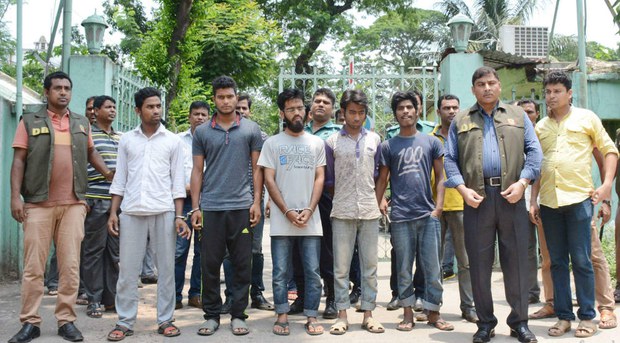Bangladesh Supreme Court Orders Police to Change Arrest Practices
2016.05.24
Dhaka
 Under a Supreme Court ruling, police, shown here presenting a group of suspects to the media, must show their badges and be in uniform when making arrests, May 24, 2016.
Under a Supreme Court ruling, police, shown here presenting a group of suspects to the media, must show their badges and be in uniform when making arrests, May 24, 2016.
In a move aimed at bolstering civil liberties and preventing police abuse of power, Bangladesh’s Supreme Court ruled Tuesday that law enforcement agencies could no longer arrest suspects without a warrant, among other things.
Human rights advocates hailed the ruling stipulating that officers must also inform suspects of the reason for their arrests within three hours as well as notify their relatives. In addition, the court order requires officers to identify themselves by showing their badges, saying they can no longer carry out arrests in plainclothes but in uniforms, rights advocates said.
The lack of such practices and arrests made under Sections 54 and 167 of the country’s penal code have led to the disappearance of hundreds of innocent people over the years, after they were arrested by law enforcement officials, according to advocates.
“This is victory for us, for the people in general. The section 54 and the section 167 have been being misused for decades. Today’s Supreme Court judgment is historic,” Nur Khan, acting executive director of rights body Ain-O-Salish Kendra, told BenarNews on Tuesday.
Some police officers arrest innocent people as suspects and remand them to extract confessions through torture, he alleged.
“This sort of practice cannot go on. We hope the police will abide by the apex court order,” Khan said.
The case before the apex court dates to 2003 and stems from a writ petition filed after a university student, Shamim Reza Rubel who was arrested under Section 54. According to a medical report, he died of torture while in police custody.
“The court has rejected the state appeal and upheld the 2003 High Court orders on amending the sections 54 and 167. Now the government must abide by the 15-point guidelines of the High Court,” Kamal Hossain, a lawyer who pleaded against the state, told reporters, according to local media.
“They must show identity cards before [making arrests] and inform the accused of the reason within the next three hours,” Bangladeshi news outlets quoted Barrister Amir-ul-Islam as saying.
Section 54: Necessary deterrent?
Attorney General Mahbubey Alam defended the record of law enforcement agencies, telling local media that all officers abide by the practice of showing suspects their badges.
For his part, Home Minister Asaduzzaman Khan Kamal told reporters at his office that police were careful in enforcing sections 54 and 167.
“We must abide by the directives of the Supreme Court in this regard. In case any police official is found guilty of misusing the two sections, he will face departmental actions,” the minister said.
But Law Minister Anisul Huq voiced disagreement over the court’s decision, saying that Section 54 in particular was an emergency provision that was essential in fighting crime.
“This is not right that the law enforcers should only be active after a crime takes place. The police [should] have the authority to arrest a criminal suspect [as a deterrent measure],” Huq said.







